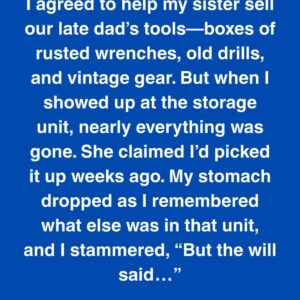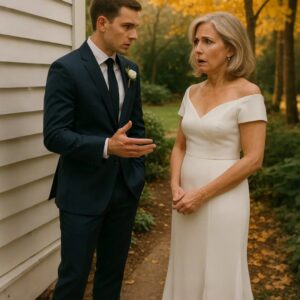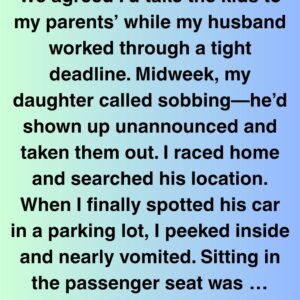I tensed up at the sight of a police vehicle stationed outside our residence. Though the sirens were silent, anxiety gripped my insides. Two police officers stood there, which made me reluctant to exit. My child Isaiah was inside, my spouse was absent, and as an African American family, I was acutely aware of potential risks.
With a shaky exhale, I opened the door. “Isaiah?” My voice trembled slightly.
Isaiah rushed up excitedly. “Mom! Did you notice?”
A Caucasian officer with short-cropped hair turned toward me. “Your son acted quite heroically, ma’am.”
Heroically? I struggled to process this information. I glanced at Isaiah, then at the female African American officer who gave me a comforting nod. Yet my body remained tense, my fingers chilled.
“A suspect was fleeing through the area,” the officer explained. “Wanted for theft. We nearly lost track until your son performed… that maneuver.” He laughed briefly.
Isaiah jumped enthusiastically. “I utilized my—”
I grasped his arm gently. “You assisted the officers?” I asked softly, searching his expression with concern rather than anger.
Isaiah confirmed proudly. “Yes! They caught him because of me!”
I took a breath, observing the officers again. The female officer smiled. “He truly helped. It was quite ingenious.”
I relaxed slightly, though still anxious. Isaiah was unharmed and not in trouble. Still, I needed to understand how my nine-year-old had helped capture a thief.
Isaiah beamed. “It was simple, Mom! I just used my…”
I noticed an object in his hand—the homemade slingshot from his summer camp last year. I recalled his excitement, shooting pebbles at empty cans while my husband Desmond supervised, teaching him safety precautions and ethical usage.
Never did I imagine he’d use it to stop a criminal suspect. My pulse quickened as I addressed the officers.
“How exactly did he use that?” I asked carefully.
Officer Clark smiled. “We were pursuing a suspect—a petty thief targeting cars nearby. He jumped into your yard, and we thought he’d escaped. But your son was outside, spotted him, and—” He paused admiringly. “Your child simply aimed that slingshot and hit the suspect’s leg with a small stone.”
Isaiah confirmed excitedly, moving closer to me. “I only acted because I noticed the pursuit. I didn’t want the suspect to escape. I targeted his trousers to avoid serious injury. It succeeded! He stumbled, allowing the officers to apprehend him.”
A mixture of relief, concern, and unexpected pride made me lightheaded. “You actually did that?” I asked breathlessly, placing my hand on my chest.
His face lit up. “Yes, Mom! I’m completely unharmed, I assure you.”
Officer Clark verified, “He’s accurate. The suspect fell on his knee just long enough for us to capture him.”
I released a slow breath. My thoughts raced with numerous questions: Should I reprimand him for interfering? Should I express pride? Should I express worry about his risky behavior? Yet, the most natural response emerged:
“Well,” I stated quietly, “I’m simply relieved you’re unharmed.”
Officer Barnes, the African American policewoman, approached. “We understand this may be startling, Ma’am, but your son’s resourcefulness assisted us significantly. We wanted to express our appreciation. Few children—or even grown individuals—would show such bravery.”
I inhaled deeply, gradually releasing my tension. Nevertheless, I remained somewhat guarded. “Thank you,” I replied. “I’m pleased everything resolved positively.”
Isaiah radiated joy beside me. He raised his slingshot triumphantly. “I told you I was skilled at this, Mom,” he said, suppressing laughter.
Later, after a more complete explanation from the officers, I offered them water. I felt uncertain about this decision—hosting police in my home created discomfort, particularly considering current social tensions. However, they appeared sincerely thankful for Isaiah’s assistance and wished to establish friendly relations.
In our kitchen, Officer Clark elaborated that the suspect had been burglarizing vehicles across multiple communities for several weeks. He was finally spotted by patrolling officers and fled. Isaiah was outside, practicing with his slingshot and cans, when the suspect ran through our property.
Officer Barnes added, “We discourage civilian intervention, especially from youngsters,” she explained gently to Isaiah. “However, we must acknowledge your substantial help today.”
Isaiah responded respectfully. “I comprehend. I intervened solely because I saw your pursuit and feared his escape.”
I placed my hand on his shoulder. “You still need caution, sweetheart,” I advised, balancing pride with concern. “People’s reactions can be unpredictable.”
Officer Clark agreed. “That’s wise counsel. Outcomes could have differed. But fortunately… it ended well. We appreciate that.”
Officer Barnes addressed me. “We wish to give Isaiah a small acknowledgment for his courage. Such bravery is uncommon. Our department hosts a monthly event honoring community heroes—individuals who assist with public safety. We would like to present him with a certificate and possibly arrange a photograph with our chief. Simply as gratitude.”
I felt emotional. “That’s extremely generous. Isaiah would be thrilled, correct?”
Isaiah’s gaze widened. “Seriously? Me? I—well, absolutely!” He was already visualizing himself with the police chief, receiving recognition.
Approximately thirty minutes later, the officers departed, taking the culprit in their vehicle. They reassured me everything would resolve favorably and promised future contact. I shut the entrance door, my pulse still racing, but thankful the atmosphere had lightened.
Isaiah jumped into the sitting area, slingshot still clutched. “Mom, did you observe them?” he asked eagerly. “They called me a hero!”
I deposited my keys and phone on the dining surface. “Yes, darling, I noticed. But we should discuss this briefly, alright?”
He acknowledged, his expression becoming solemn. He recognized from my voice that an important conversation was necessary.
I led him to the sofa where we seated ourselves. “Firstly, I feel immense pride,” I started, grasping his hand. “You acted instinctively to assist. I’m relieved you’re safe. But do you realize how risky that situation could have been?”
He considered my question thoughtfully. “Because he was a criminal who might have attacked me?”
I confirmed. “Precisely. Often, individuals fleeing authorities can behave desperately or fearfully. Had he spotted you before your pebble struck, he might have confronted you.”
Isaiah’s posture deflated slightly. “I hadn’t considered that,” he confessed. “I simply wanted to help.”
I tightened my grip on his hand. “I know, honey. I admire your intentions. I just want you to remain safe. Your wellbeing matters greatly to me, your father, and everyone who cherishes you.”
He nodded gravely. “I comprehend.”
After pausing, he examined the slingshot in his grasp. “Mom,” he inquired softly, “may I still keep this?”
I inhaled deeply and contemplated. The issue wasn’t the slingshot itself—but rather its application. “You may, with one stipulation: never aim it at people unless absolutely necessary. Also, please alert me or Dad if you notice anything suspicious. The officers themselves stated they discourage civilians risking injury by intervening.”
His expression brightened. “Yes, Mom. I give my word.”
That night, my spouse Desmond returned from his workplace. I greeted him at the entrance, still processing the day’s events. As he entered the hallway, I recounted everything: police presence, the burglar, Isaiah’s courageous action, and the planned recognition at the police headquarters.
Desmond stared in astonishment. “What? Is that true?” He looked towards Isaiah, who peered shyly from the living area doorway with a timid smile. “You actually performed that action, son?”
Isaiah confirmed with a nod, moving his feet nervously. “Yes, Dad.”
Desmond embraced him warmly. “I feel proud of you,” he remarked with a gentle expression, lowering Isaiah back down. Then he glanced at me with visible worry. “He remained uninjured, correct?”
I indicated no. “He’s perfectly fine. Just… we must emphasize he shouldn’t attempt similar actions unless absolutely necessary.”
Desmond addressed Isaiah again. “Your mother speaks correctly. Your safety matters most. Still, you showed courage. Well done, son.”
Isaiah glowed with happiness.
Over the following seven days, tales about “the youngster with the slingshot” circulated through our community. Several neighbors visited to question Isaiah about his ‘experience’ and express gratitude for enhancing local security. I used these moments to clarify we discouraged Isaiah from dangerous behaviors, while also appreciating their supportive attitudes.
Eventually, the ceremony day arrived. Our family traveled together to the neighborhood police department. My nerves stirred slightly—I typically avoid law enforcement settings, and memories of last week’s unease persisted. However, upon arriving at the station’s lot, Officers Clark and Barnes stood waiting, waving at us. Their friendly expressions reduced my anxiety somewhat.
Isaiah wore a clean polo shirt with khaki shorts—the smartest outfit he would endure for any significant duration. He held my hand tightly, displaying a mixture of anticipation and nervousness.
Inside the station’s reception area, a small gathering—including other “community heroes” recognized for various beneficial actions—had assembled. The police chief, a tall individual with silver-streaked hair, greeted us and shook Isaiah’s hand.
The ceremony commenced with brief remarks about community participation’s value and children’s potential as exemplars. I became emotional as they discussed how neighborly vigilance creates safer environments.
Soon after, they summoned Isaiah forward. Officer Clark positioned himself beside him, holding a microphone. “This child utilized an exceptionally creative, unexpected technique to assist us in apprehending a fleeing suspect. Let’s just mention it involved a slingshot.” Gentle chuckles spread throughout the audience. “While we emphasize everyone should avoid placing themselves at risk, we also wish to acknowledge him for acting when he deemed it necessary. His bravery and rapid thinking simplified our task considerably.”
Isaiah gazed at the microphone, squinting under the bright lights. He spoke softly, “Um… thank you.” Then he looked toward Desmond and me, and I nodded supportively. He spoke louder. “I—I simply acted according to my judgment. However, I realized I should exercise caution. I’m thankful nobody was injured.”
Applause erupted as the chief presented Isaiah with a framed document. We captured several images—Officer Barnes joined in, smiling for a photograph too—while everyone clapped enthusiastically.
Following this, the chief revealed an unexpected gift. “Isaiah, representing our community, we wish to present you with a small token. It’s a voucher for our local athletics store—you appear to possess talent for accuracy, so perhaps you’ll discover something beneficial there.”
Isaiah’s mouth gaped upon seeing the voucher’s value. “Truly?”
“Yes, absolutely,” the chief replied with a smile. “Just remember to practice safely. We anticipate your future accomplishments.”
That evening at home, Isaiah displayed his certificate to everyone, including my sister who visited to hear about the event. His pride was barely containable. I could still observe that special gleam in his eyes, the satisfaction of someone who performed a meaningful action and received recognition.
Desmond and I offered a gentle reminder: “Significant abilities require significant accountability. Even with just a slingshot, you must employ it judiciously.”
He agreed, clutching the certificate tightly. “I shall, I guarantee it.”
Now, resting on my sofa after the commotion has diminished, I contemplate the emotional rush I experienced upon first seeing those police officers in my yard. Terror. Worry. News story flashbacks crossing my thoughts. Yet this particular situation revealed officers with positive intentions. My child remained safe—while also contributing to neighborhood security.
I maintain realism; I recognize not every interaction will prove this favorable. Perhaps the insight here suggests that occasionally, optimism and collaboration are possible. Sometimes, we must embrace trust over apprehension—particularly when our children, with their generous spirits and vibrant personalities, choose to step forward and create positive change.
Isaiah gained a valuable insight: courage also requires caution. He recognized his action carried danger, yet also discovered that kindness and fairness can create significant effects. For me, I realized maternal affection possesses enough strength to simultaneously hold anxiety and honor.
I trust our experience serves as a reminder that community still involves mutual protection, and that reasonable wariness combined with abundant compassion can yield remarkable results. Occasionally, we discover heroes in unexpected locations—even within our own property, equipped with merely a slingshot and substantial bravery.
I appreciate you taking time to read our account and participating in our solace, admiration, and fresh outlook. If this narrative affected you emotionally, please distribute it to someone special. Remember to approve this article—your endorsement holds greater significance than you realize. Let us continue to encourage one another, through individual compassionate gestures.





